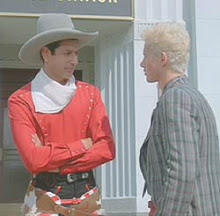
441. ROLLINS BAND, "Liar"
Produced by Theo VanRock; written by Rollins Band
Imago 25072 1994 Did not make pop charts
You know, nobody really gets Al Jolson anymore. I'm not saying he's my favorite entertainer or anything, just that nobody gets why he was so popular when he was. For the most part, his success wasn't about imitating African Americans, not the way that Gosden and Correll pathetically attempted to do so on Amos n Andy, not the way an earlier recording star like Arthur Collins did when he recorded what were at the time called "coon songs." Jolson recorded numbers that could be sung independent of perceived race, as witnessed by the fact that a good chunk of the songs that Judy Garland sang in her famous Carnegie Hall concert came out of the late singer's repertoire.
Live, Jolson did perform in blackface, but that wasn't always about the perceived imitation of African Americans for the most part. Jolson's kind of blackface derived from the effacement of African Americans, just as Godsen and Correll's came from a caricature of them. (Both kinds are racism--just pick your poison.) Jolson's blackface sprung from the widely shared white assumption that people with darker skin were more passionate, more in touch with their emotions. When Jolson put on the makeup, he felt it gave him license to indulge his emotions more, to almost break down, as he did every time he performed "Mammy" or "Dirty Hands, Dirty Face." Watching Jolson was not about having a jokey, fun time. It was about seeing if the runaway train would actually run off the tracks this time, the way it always threatened to.

Which brings me, finally, to Henry Rollins. Whatever this single is, it isn't punk. It's a little playlet, with choruses where the villain twirls his mustache in an aside to the audience as sweet Little Nell still suffers with no hope of being rescued by a strapping beau. Genderwise, Rollins is getting his cake and eating it too here, adopting a feminist critique of sexist behavior while still getting to act out the scene with an aggression I'm sure you didn't get to see in your Women's Studies class. Henry's just a little too into being the bad guy here, probably even more than he is into explaining exactly how other people should act. But the real thrill of the song, I think, is whether he's going to totally lose it. Actually losing it? That would be punk. Teetering on the edge of a breakdown for four minutes? That's Jolson--if he pumped iron.

No comments:
Post a Comment